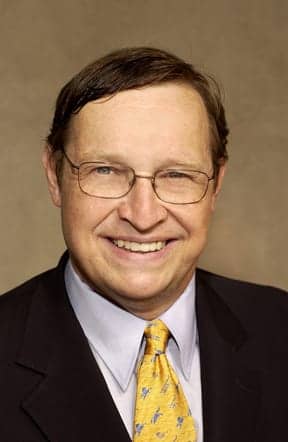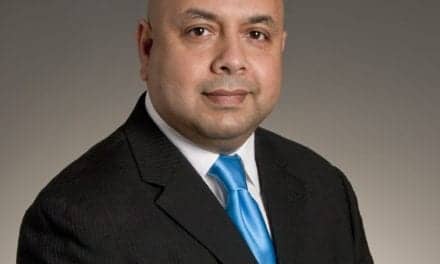By David H. Kirkwood
This month’s Blog Page is an abridged version of a blog entry (June 26, 2013) by David Kirkwood that can be found at his Hearing News Watch blog.
The major professional organizations in audiology are more divided now than ever over which federal legislation will best support their members’ ability to serve Medicare beneficiaries.
In past years, the American Academy of Audiology (AAA), the Academy of Doctors of Audiology (ADA), and, until 2011, the American Speech-Language-Hearing Association (ASHA) all favored direct-access legislation for Medicare beneficiaries.
Such bills would allow older Americans to go directly to an audiologist for Medicare-covered services without need for a medical referral. Although they have been introduced in every new Congress since 2005, direct-access laws have never come close to enactment, at least in part because of adamant opposition from the American Academy of Otolaryngology-Head and Neck Surgery (AAO-HNS), which wants to preserve ENT physicians’ gatekeeper status to audiologic services for Medicare patients.
ASHA & AAO-HNS Team Up
This year, a very different bill was introduced in the House of Representatives. Although its name, the Medicare Audiology Services Enhancement Act of 2013, sounds much like the Medicare Hearing Health Care Enhancement Acts introduced in 2007, 2009, and 2011, its content and its supporting cast are very different.
Unlike the earlier bills, HR 2330 would not give Medicare beneficiaries direct access to audiologic care, which is why AAA (tentatively) and ADA (vehemently) oppose it, and why AAO-HNS has agreed to support it.
ASHA, which 2 years ago abandoned the direct-access approach in favor of trying to expand Medicare coverage of audiologic services, issued a statement applauding the new bill.
Why ASHA Supports HR 2330
In its statement, the association said that the measure, introduced June 13 by Rep Gus Bilirakis (R-Fla), “would provide Medicare beneficiaries greater access to audiology services and would allow audiologists to provide diagnostic and treatment services across their full scope of practice.”
Patricia A. Prelock, PhD, president of ASHA, said that the measure “is an important step in making sure Medicare patients are covered for the full range of professional services provided by audiologists.” She added, “ASHA has been working hard to make expanded access to audiology services under Medicare a reality, and we applaud Rep Bilirakis for his leadership.”
Prelock, who like the vast majority of ASHA members is a speech-language therapist, added, “HR 2330 would allow audiologists to bill for hearing and balance assessment services, auditory treatment services (including auditory processing and auditory rehabilitation treatment), vestibular treatment, and intraoperative neurophysiologic monitoring.”
AAO-HNS’s Position
In response to an inquiry about AAO-HNS’s position on the measure, Kathy Lewis, the senior director for communications, wrote to Hearing News Watch that the introduction of HR 2330, and her organization’s support for it, followed long discussions between representatives of AAO and ASHA.
Lewis said that the bill is “designed to align Medicare coverage of comprehensive audiology services with current billing and reimbursement standards of other non-physician therapeutic services covered by Medicare (PT, OT, SLP).”
She cited “several key points associated with the Academy’s position regarding HR 2330, as introduced. First, the bill puts into statute the physician referral and physician oversight of patient treatment plans that the AAO-HNS believes are core tenets of team-based hearing healthcare services. Second,” she emphasized, “HR 2330 does not provide direct access to Medicare patients.
“Third, HR 2330 permits broader billing of services by all audiologists, including those employed by otolaryngologists. And finally, the bill preserves the application of existing state scope-of-practice laws. The Academy’s support for HR 2230 is contingent upon these key provisions being retained during the legislative process.”
AAA’s Opposition to HR 2330
If the Medicare Audiology Services Enhancement Act is going to become law, it will almost certainly have to do so over the opposition of both the two major audiologist-only organizations. ADA issued a formal statement on June 20 criticizing HR 2230, and Deborah Carlson, PhD, president of AAA, stated that the academy was unlikely to support it.
More than any other organization, the American Academy of Audiology has made gaining direct access for Medicare patients to audiology its highest legislative priority. Also, as reported in two posts in this blog, AAA commissioned a consultant’s report that found that giving Medicare beneficiaries direct access to care from an audiologist would reduce costs to Medicare by $173.3 million over the next 10 years by eliminating duplicative audiological services and unnecessary evaluation and management services.
Therefore, it is no surprise that, in her reply to a query from this blog, AAA President Carlson raised serious concerns about what has been introduced in Congress. In a letter to this blog, she wrote: “Based on our initial review of the legislative language and according to the information on ASHA’s Website, HR 2330… would require audiologists providing treatment and rehabilitative services to ‘… develop a plan of care and submit the plan of care to the beneficiary’s physician. A physician order or referral will also be required as a condition for Medicare reimbursement.’”
She continued, “This statement leads the Academy to believe that, if passed, this bill would increase physician oversight of audiologists for the added services that are already within audiology’s scope of practice and do not currently require physician oversight.
“Additionally, audiology services provided to Medicare beneficiaries would be at greater risk for decreased reimbursement and, since the proposed legislation would not afford audiologists the ability to opt out of Medicare, participating audiologists would be subject to reimbursement rates for services as assigned by CMS. Medicare reimbursement rates for covered audiology services are already currently lower than the actual cost of providing the service. Further reductions could result in audiologists’ inability to continue to treat Medicare patients, thereby restricting care to beneficiaries in need.”
In concluding, the AAA president said, “…the Academy is unlikely to support this initiative, as it is contrary to our pursuit toward greater professional autonomy, improved access to audiologists for Medicare beneficiaries, and fair, sustainable levels of reimbursement for services provided by audiologists.”
In a separate exchange with this blog on June 26, Carlson said that AAA is “working towards the reintroduction of direct-access legislation in this Congress. The Academy continues to advocate for improved access to audiologists for Medicare recipients by eliminating the physician referral requirement.”
ADA’s Opposition to HR 2330
In a statement released on June 20, the ADA said that after careful review of HR 2330, it “regrets that it must strongly oppose the bill’s passage. ADA will work diligently to ensure that the bill is not adopted by Congress now or in the future.”
The statement continued, “ADA is deeply disappointed that [ASHA] chose to advocate for legislation that is not in the best interests of Medicare beneficiaries, the general public, or the audiology profession. Despite the name given to the bill, it will not enhance Medicare Audiology services at all and it will have a number of negative impacts on patients and audiologists.”
In the ADA statement, Nancy Green, AuD, president of the organization, said, “We are disappointed that ASHA, an organization that claims to represent audiologists, would be so supportive of legislation that will undermine both patient choice and the autonomous practice of audiology. ADA will not stand by and allow this egregious and misguided assault on our patients and our doctoring profession to go unchallenged.”
In its statement on HR 2330, ADA pointed to its preferred approach, the 18×18 Movement, which it launched at its annual convention last November. This initiative, it said, calls for “a truly comprehensive audiologic benefit under Medicare as part of broader legislation…that allows Medicare patients to have ‘direct access’ to audiologists, eliminating the need for a physician referral.”
According to ADA, the proposed 18 by 18 legislation, if enacted, would allow by 2018 for Medicare coverage of services such as vestibular rehabilitation, cerumen removal, and aural rehabilitation provided by an audiologist, eliminate the need for the physician order required for a Medicare beneficiary to receive coverage for audiology and vestibular services, and give audiologists the autonomy to make clinical recommendations and practice the full scope of audiology and vestibular care as allowed by their state license and as dictated by their educational requirements and competencies. For details, visit: http://www.18×18.org
AAA and ADA Also Differ on Strategy
While AAA and ADA agree on what’s wrong with the legislation backed by ASHA and AAO, they part company on 18×18.
In reply to an inquiry from Hearing News Watch, AAA President Carlson wrote: “While the Academy philosophically agrees with the policy on which ADA’s 18×18 initiative is based, we feel the expansive nature of this legislation does not align with the current Congressional climate.”
She added that AAA has decided that “maintaining efforts toward direct access, an initial step in the overall path to improved access to care for Medicare beneficiaries and increased autonomy for audiologists, is in the greatest interest of the profession and the patients we serve. For the academy to shift our course to a new, long-term, effort at this time would be a disservice to our membership.”

|
David H. Kirkwood is a founding partner and associate editor of hearinghealthmatters.org. He has been reporting on hearing health care since 1990. |




